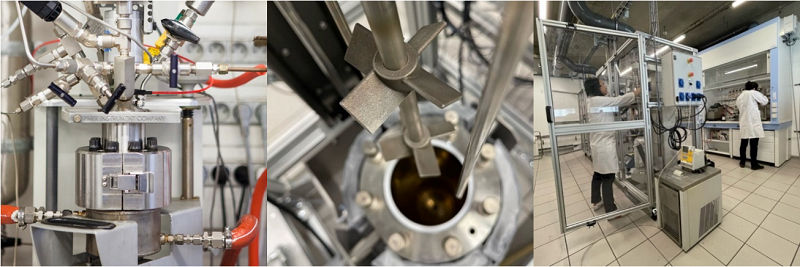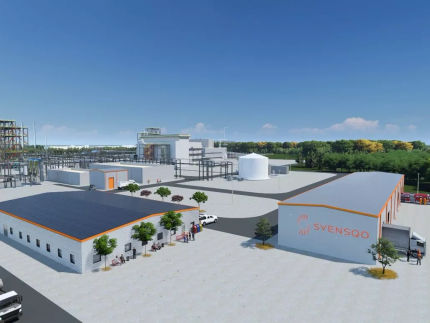Arkema, CNRS, Claude Bernard Lyon 1 University and CPE Lyon join forces to design the batteries of the future
Improving the performance of materials used in lithium-ion and lithium-sulfur batteries is a priority to meet portable energy needs
Advertisement
An increasingly large share of portable energy needs will be supplied by mobile energy storage devices, such as lithium-ion batteries. Arkema, CNRS, Claude Bernard Lyon 1 University and CPE Lyon have just created iHub Poly-9. This joint laboratory will be dedicated to the design of new high-performance materials based on fluoropolymers, which will be used in future generations of batteries.

The reactor allowing polymerization at 80 bars of pressure.
© Timothy McKenna.
With electric cars, smartphones and laptops, the need for mobile energy storage devices is constantly increasing. This demand is met by lithium-ion batteries. They are composed of two electrodes that do not touch each other thanks to the presence of a separator, all of which are immersed in an electrolyte. Different fluorinated polymers, a family of molecules to which KYNAR® PVDF belongs, offer excellent cost/performance ratios as cathode binders and separator coatings, making it possible to improve battery performance: energy density, power, storage capacity, life span, reliability, etc.
The Catalysis, Polymerization, Processes and Materials research laboratory (CP2M, CNRS/CPE Lyon/Université Claude Bernard Lyon 1) has been conducting research on polymers manufactured under high pressure for more than 30 years, with a focus on fluoropolymers for the past ten years. This has led to the alliance today between Arkema, CNRS, Université Claude Bernard Lyon 1 and CPE Lyon, within a new joint laboratory: iHub Poly-9. This laboratory works in partnership with Arkema's newly created battery center of excellence at the Pierre Bénite site.
"I am delighted with this partnership with Arkema, which is part of a long history of cooperation. We are pursuing a constant policy of developing joint laboratories with companies of all sizes, as confirmed by the more than 200 joint laboratories already in existence. This ambitious form of collaboration between business and academia is based on fundamental research to provide a response to major industrial challenges," said Antoine Petit, President and CEO of CNRS.
"This laboratory is another joint initiative in the long-standing collaboration between Arkema and the CNRS. It is a perfect illustration of Arkema's ongoing commitment to open innovation and partnerships with the academic world. This enables us to draw on the best expertise to develop sustainable, high-performance materials in strategic areas such as batteries and hydrogen," says Armand Ajdari, Arkema's Director of Research and Development.
The scientists involved are particularly interested in polyvinylidene fluoride and its copolymers. This family of polymers is extremely stable chemically and electrochemically. Their synthesis, which takes place in a water-dispersed medium, requires high pressures that can exceed 100 bars, an expertise that CP2M has at its disposal, with reactors capable of reaching these pressures in complete safety.
The collaboration with Arkema mainly involves five PhDs studying the synthesis and design of fluoropolymers for the energy sector, including one thesis funded by the Auvergne Rhône Alpes region, and three CIFRE theses funded by the company, as well as the purchase of equipment for a 50 m² laboratory dedicated exclusively to iHub Poly-9 within the CP2M premises.
Note: This article has been translated using a computer system without human intervention. LUMITOS offers these automatic translations to present a wider range of current news. Since this article has been translated with automatic translation, it is possible that it contains errors in vocabulary, syntax or grammar. The original article in French can be found here.
Other news from the department science
Most read news
More news from our other portals
See the theme worlds for related content
Topic World Battery Technology
The topic world Battery Technology combines relevant knowledge in a unique way. Here you will find everything about suppliers and their products, webinars, white papers, catalogs and brochures.

Topic World Battery Technology
The topic world Battery Technology combines relevant knowledge in a unique way. Here you will find everything about suppliers and their products, webinars, white papers, catalogs and brochures.






























































